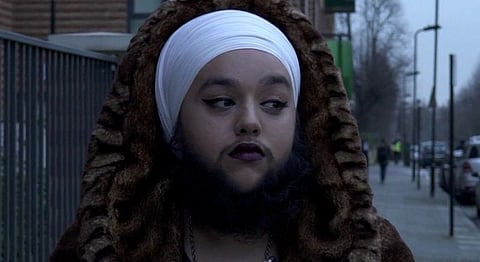
- HOMEGROWN WORLD
- #HGCREATORS
- #HGEXPLORE
- #HGVOICES
- #HGSHOP
- CAREERS
- ABOUT US
- CONTACT US

This post originally appeared in Kajal Magazine.
I was twelve when I shaved my legs for the first time. I remember bending over in the shower, hacking away at the soft growth like it was a poisonous weed. My skinny knees were covered in cuts that hurt for days after. I started shaving because the girls in my P.E. class would stare at me and I kept shaving because people still stare.
It’s hard to be brown and hairy, something that Harnaam Kaur and Aisha Mirza know too well.
In Mirza’s new short film “Fuck Me or Destroy Me,” filmed and edited by Tim Travers Hawkins, bearded woman Kaur is followed as she walks through the streets of London. The racial and queer politics of body hair lay fully exposed as she winds her way.
Kaur, who holds the Guinness World Record for being the youngest woman in the world with a full beard, receives stares and dirty looks as she strolls. She is guarded only by her thick fur coat and her impassive face. It’s almost like everything others throw at her rolls off her.
“She explained to me that sometimes she feels like a woolly mammoth in a world of thin blonde woman. A big, brown, hairy woolly mammoth with an insatiable appetite for everything good, taking up space, constantly being told to keep her snout to herself.”
The name of the film comes from a conversation Mirza had with a trans friend.
“I was having a conversation with a good friend of mine about how visibility is not always a good thing — about the ways it makes people vulnerable,” Mirza told Kajal. “She talked about the experience of walking down the street as a trans person and the tension she feels in people’s glances and actions, what that passion is, how they don’t know what to do with themselves, how she can see them trying to work out if they want to fuck her, kill her, or be her. That always stuck.”
Mirza has always been interested in the confluence of racial identity, sexual identity, gender, body hair and mental health. She says she finds body hair norms for women and femme people “absurd.” But she still finds it a difficult culture to upend.
“It requires a different kind of strength and sacrifice to challenge body hair norms as a Pakistani woman than it does for a white one, for example,” Mirza said. “There is so much more at stake when a person of color tries to experiment with their body in ways that society has deemed unacceptable.
“I had dinner with a brilliant brown friend who is having full body laser hair removal treatment (the most pain she has ever felt) because as much as she would like to challenge body hair norms, she also wants some fucking peace. She explained to me that sometimes she feels like a woolly mammoth in a world of thin blonde woman. A big, brown, hairy woolly mammoth with an insatiable appetite for everything good, taking up space, constantly being told to keep her snout to herself.”
The mental conversation we all have around body hair also compels Mirza. Wanting a break from having to think about body hair (will I shave? can I avoid waxing for a few weeks? and on and on) is very real. The “headspace that is used up worrying about body hair” and being “hated for such an abundant part of your body” are both central to Mirza’s film.
“I wanted to make a film where Harnaam did not have to be strong, and did not have to explain herself.”
Kaur, the subject of the film, has spoken often about the bullying she suffered at school and the resulting mental health issues which led her to self-harm. Kaur has polycystic ovary syndrome, a condition that causes her to grow an excess of facial and body hair. Shaving or waxing often made her skin irritable and raw with scabs. At one point, her depression over her appearance was so overwhelming she considered suicide. At 16, she made the decision to accept her beard and herself.
Kaur’s story inspired Mirza to take a different approach to her film.
“I wanted to make a film where Harnaam did not have to be strong, and did not have to explain herself,” Mirza said. “I wanted to create a space where Harnaam could be looked at, and look back, and also just exist. We settled on this experimental film format as it gave us space to try to tell her story in a new way, with nuance, and perhaps shielded her from the ‘Sikh woman is not allowed to cut hair and therefore grows a beard’ white-washing narrative which abounds in the media.”
In the film, Kaur doesn’t actually speak. Instead, a single song serves as her voice. Mirza wrote the song, along with the lyrics “This is my skin light-filled brown and I’m not sorry, baby, all I did was sit / You don’t know if you want to fuck me or destroy me, I’ll be your freak show for a bit.” It was produced by TYGAPAW, using tabla and Ravi Shankar sitar samples.
So far, Mirza says, the reception to the film has been ultimately positive.
“I think the film is also quite confusing for a lot of people, it brings up discomfort and defensiveness in some people and it gets shut down at first because people feel attacked,” she said. “But 40 minutes later somehow we are always still talking about it. Literally everyone has a body hair story up their sleeve, or down their knickers, or whatever.”
